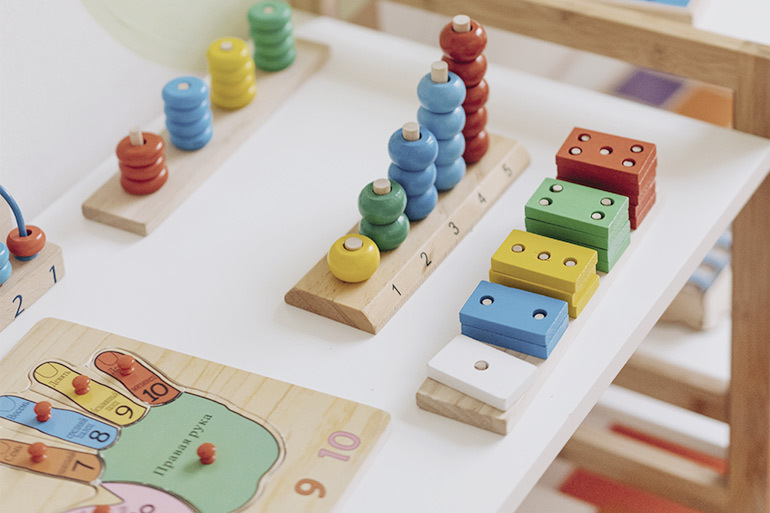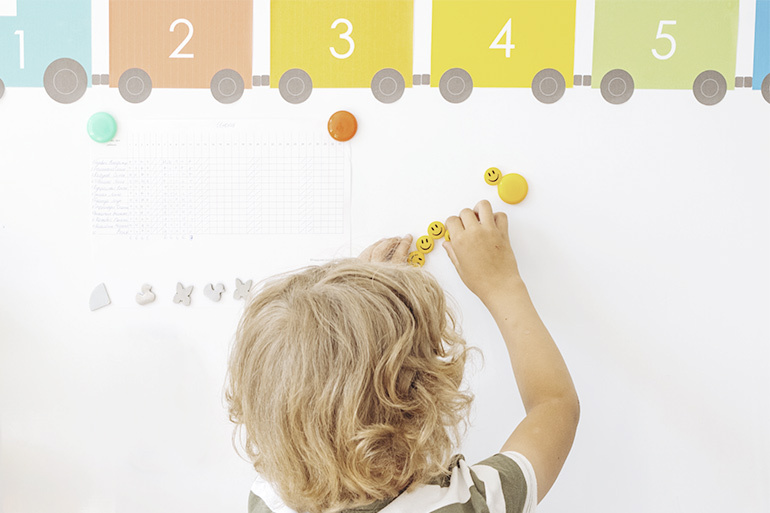March 10, 2022
September 7, 2022
Finding someone to look after your baby is a big decision that new parents face when returning to work. Maternity and paternity leave in Spain allow a baby to be home for several months following birth, but choosing a nursery is a large task for families, particularly expat families who wish to start their children in childcare programs for both language and developmental reasons.
What to know about choosing a nursery in Spain
At its most basic, nursey schools, called guarderías, will care for children from ages three or four months until around three years old. Like all services in Spain, a large portion of daycares are state-run and thus receive heavy government subsidies to cover operational fees; you can also find privately-run daycares that do not operate on public funds and thus rely on tuition, as well as educational philosophies and rules to fit anyone’s views.
For this reason, it’s important to consider options beyond proximity to the home: when choosing a nursery for your child, make a list of questions for the nursery director that encompass the logistics, pedagogy, support and anything your family considers important in early education. For some, nursery school is a place for the child to be safe while the parents work. For others, it’s a fundamental step in child development.
My children have just finished the daycare stage, and it was not without its ups and downs, spanning five years and four centers in two autonomous communities. What I wish I knew back then was how important childcare would be for me as an expat living far from family and with a full-time job. I wrongly assumed it would be easy to simply show up and get my child a place. Here’s what I learned:
1. Must children attend nursery in Spain?
No, there is no obligation for children to be enrolled in a daycare center, as compulsory education starts at age six nationally. That said, many parents choose to enroll their child in preschool. Some autonomous communities may have a law that stipulates that children must be enrolled in an early education center the year the child turns three, though this could be a nursey that provides care to children up to age 6.
2. When is the daycare center open, and what sorts of schedules are available for working parents?
Para gustos, colores – daycare centers can operate within local parameters as set out by the regional government, as well as the clients they serve. For example, a small daycare center may operate only through lunchtime, whereas one next to a hospital, until late into the night to accommodate healthcare workers.
If a center is public or supported by public funds, check with the center to see if there are limits to the number of hours your child can be looked after and what their operating hours are. In Madrid, our center was only open from 8 a.m. to 5 p.m., but in Seville, I could leave my children until 7 p.m for the same price as getting them at 2 p.m. Both centers were private.
Remember to ask what days the center closes for local and national holidays, too. For example, I could send my kids to school during part of my Christmas holidays or part of Easter Week; now that they’re in school, I will have to look at care for them during these times. Generally speaking, daycare centers will open so long as it’s not a local, regional or national holiday. You should also ask about options during the months of July and August, as centers may have to close for an entire month to allow their staff to take their well-deserved holiday time.
My take: having a private center allowed more flexibility for me with meetings or appointments. And I miss my children having a safe environment during summer months!
3. What is the initial cost of care, and how much do extras cost? Is anything else included?
Unlike my native United States, daycare is a more moderate monthly expense. In the case of public centers, nursery costs are subsidized by government funds and then prorated according to household income; in fact, turning in financial records is part of the application process. If a center is private, expect to pay out of pocket; prices are usually determined by competition in the neighborhood.
You can also ask if your family qualifies for additional “bonos”, or rebates for special circumstances. In Madrid, I received an automatic 90€ rebate for being a working mother who needed childcare at least eight hours a day.
Speaking broadly, a daycare may have a sliding scale of costs, and there are add-ons that you can pay for in addition to the basics of tuition. These could include extra hours beyond the scope of what tuition costs, a weekly doctor or psychologist visit, extracurriculars like language or introduction to music, etc. Nurseries will provide you with a list of costs that are à la carte, so be sure to ask for them so that there are no surprises.
Oh, and many daycares require that you have a summer / warm weather uniform, and another for the winter months. Plan to spend another 100€ or so a year for these.
4. When is the application and enrollment period?
State-run daycares will have a specific enrollment period that usually coincides with the enrollment period for school. Typically, this takes place in the spring before fall intake; being prepared to sign your child up will guarantee their spot at the beginning of the period you wish to enroll. Outside of this date, consult with your province’s education office.
Private centers will usually enroll on a rolling basis (so long as there is space) and pro-rate if you sign up mid-month. Tuition is calculated monthly during the school year (September-June); ask your daycare about summer months and how payment occurs – monthly, by fortnight or even weekly or daily.
5. What documentation must I provide to enroll my child?
Once you’ve decided on a center, be sure to inquire about which documents you’ll need to provide – as well as how to submit them.
Some examples of commonly solicited paperwork are:
- Libro de familia / birth certificate
- Photo ID of both parents
- Proof of domicile (empadronamiento)
- Vaccination record
- Bank information for automatic payments
- Data protection release
Your local center may do the public application for you, too. In the case of Andalucía, my son’s daycare was public during our final year there. This meant that he was grandfathered in with a spot, though we still had to use the region-wide education app to officially enroll him. This meant, once again, turning in our financial records, empadronamiento and the like, but the director of the center kindly offered to do it for us.

6. What sort of insurance or liability insurance does the school offer?
All nurseries must be licensed to operate as an early childhood education center, and this is usually denoted in a visible place for clients. Which office or organization grants these licenses and conducts periodic inspections will depend on the region. Check that your center also has accident insurance, a contingency plan for illness and other unforeseen events. If the center is private, this is especially important.
And consider this: many families experience their children getting ill for the first time when they attend daycare. My kids have had everything from pink eye to hand foot and mouth disease from school – thankfully, the tummy bugs and runny noses are way more common. As small children need a tremendous amount of medical attention in their early years, taking out family insurance is a solid way to ensure your child gets just that. Caser’s family plan includes up to 10 visits with no copay and emergency room visits – and as any parent of young kids will tell you, having kids in daycare and exposed to germs means a lot of time at the doctor.
We lived in France for a few months, and my younger child was able to get a spot in the local crèche. They required us to provide a civil liability contract of a few euros each month in case he injured – intentional or not – another child. We ended up getting a policy through a local bank as non-residents.
7. Is food made on site, or catered in? What sorts of nutritional value does it provide?
Many children will eat lunch at daycare, and this fee may be included in the price. Some daycares will have an in-house cook, but most have food catered in from a hospitality company. Ask to see a monthly menu with nutritional values and in what conditions the food is prepared. You’ll likely have to give information about any food allergies or intolerances in addition to how and when your child eats – especially when the child is still a baby.
Speaking of which: if your child drinks breastmilk, inquire about storage and if there’s an additional fee.
Also ask if the cost covers snacks in the morning and afternoon. Many children roll out of bed, have a bottle and get dropped off, and their morning snack got them through until lunch.
8. How many teachers and aides will there be?
Daycares may be big or small, but one of the fundamentals is how many children will be in a classroom, and how many teachers and aides will be in the classroom space to supervise, protect and teach. The autonomous region decides how many children to a class per teacher. Using Andalucía as a case, the maximum ratio of children in a classroom follows:
- 0 – 1 year: no more than eight children to one teacher.
- 1 – 2 years: no more than 13 children to one teacher.
- 2 or more years: no more than 20 children to one teacher.
If you are not able to go to your first-choice daycare, space could be one of the likely reasons why.
9. What are the facilities liked? Is there any outdoor space?
You should absolutely take a tour of the daycare, if possible, to see the condition of the installations for wear and tear.
Ask about outdoor activities and what sorts of spaces allow for exploration, free play and fresh air. If you live in a city, it could be important for your child to be outside for part of the day.
10. What should I bring on the first day?
What are the expectations about what to bring for the first day. Diapers? Sheets for the cot and a soft toy for naptime? Nursery will be your child’s home away from home, so nab a list from the facility so that you don’t have to juggle the stroller plus all the goodies on the first day.
The takeaway
My youngest child recently finished his daycare days, ending a stage in which he learned to crawl, walk, feed himself and sit in a chair. I never went to daycare, so my apprehension and guilt with not leaving my job to care for him disappeared when I saw how happy he was among other kids and with a teacher who cared for his emotional and intellectual well-being.
Our experience with daycare began in Madrid, we could not get a place at the public daycare because I spent most of my maternity leave elsewhere, not bothering to call schools near my office until the baby was several weeks old. I had not only missed sign-up for the public centers in March but also struggled to find him a spot for my intended date to begin work again. He ended up in a large center for six weeks.
Thankfully, my first choice, a small, private daycare just 300 meters from my office, had space once Enrique turned six months. He stayed for two years before we moved to Seville, and we paid out-of-pocket with very few subsidies. It felt like a family member was looking after him.
When we returned to Seville, I was eight months pregnant with his brother. Not only did I need to find a place for them both at different times in the year, but I also had to wait until I was registered in the municipality. I panicked and started calling centers, eventually deciding on one without really asking any questions or meeting staff. In my gut, it felt like a poor choice but I was desperate, extremely pregnant and staring down a month-long center closure.
It was a disaster, and I knew it from the very start. I decided to give it a month, but after an injury that led to stitches, I opted for a private center close to my home that felt like Enrique’s daycare in Madrid. By then, I was wise enough to ask the important questions and go with my gut.
As I buy the little one his school supplies for Pre-K, I am thankful my children could have their emotional and intellectual cups filled while I did the same as a working mother.
.png?width=344&height=67&name=logo_caser%20(2).png)









Let Us Know What You Thought about this Post.
Put your Comment Below.